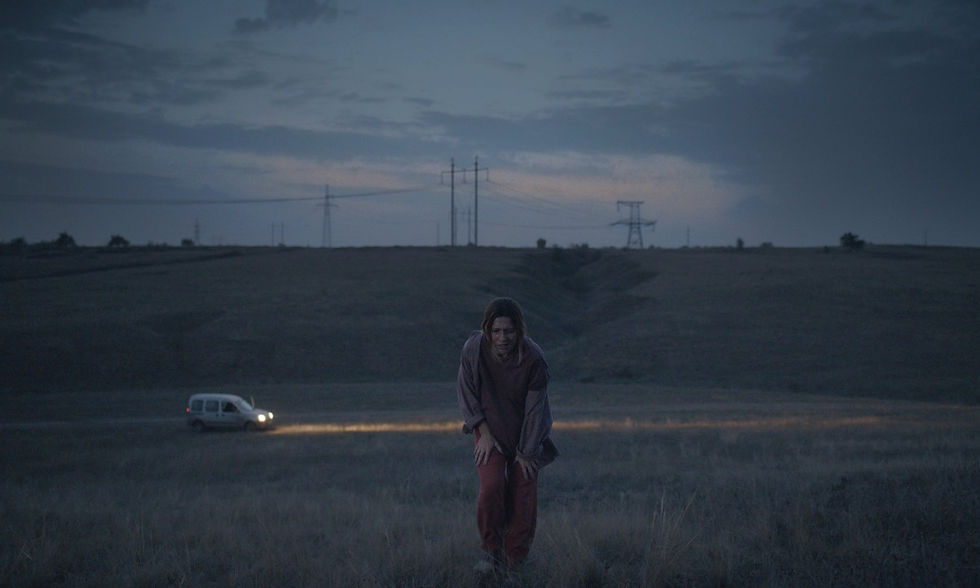Sundance 2022: 'KLONDIKE', 'When You Finish Saving The World' | War, Finn Wolfhard | Capsule Reviews
- S.J.

- Jan 23, 2022
- 3 min read
Updated: Oct 29, 2023

KLONDIKE
No matter if the film ends up being spectacular or not, KLONDIKE (Клондайк in Ukrainian) might be a hard sell both in the traditional sense and to audiences as well because of the sad reality that also serves as its premise. Irka (Oxana Cherkashyna) and Tolik (Sergey Shadrin) are a couple living in Donetsk in Ukraine and near the Russian border in 2014, during a conflict between the two countries. Irka is also pregnant when a bomb destroys a part of their house, the couple refusing to leave even as Russia-supported separatists take control of the village. We follow as they try to survive, rebuild their house and give birth to a baby.
There's an obvious through line in director-writer-editor Maryna Er Gorbach's vision from start to end, involving DoP Sviatoslav Bulakovskyi's extremely long and steady takes where you're placed to simply observe Irka, Tolik and Irka's brother Yaryk (Oleg Scherbina) doing their thing. The photography gives you an opportunity to admire fantastic production design led by Marketa Korinkova-Taplin which is visual storytelling at its best, showing how it's up to innocent civilians to build back some resemblance of normalcy in the middle of cruelty.
You'd just wish that you had more to lean on that just the sets as it's tedious to observe characters that are barely even sketches on paper, this also seemingly impacting the cast who are mostly just spouting out their dialogue without any sense of dynamics. Er Gorbach's strongest assets are visuals and the editing is the weakest since that just highlights the awkward nature of acting in the movie; to the extent that the war feels like a backdrop instead of what it actually is which is a terrible tragedy deeply touching Irka and Tolik.
Smileys: Production design
Frowneys: Characterisation, acting
2.0/5

WHEN YOU FINISH SAVING THE WORLD
There's an exploration of emotional dissonance between a mother and her teenage son in Jesse Eisenberg's directing and writing debut When You Finish Saving The World, adapted from a podcast of his. Julianne Moore portrays the mom Evelyn, head of a domestic abuse survivor shelter who gets a bit too involved with a teenager Kyle (Billy Bryk) arriving there. This is because Evelyn has a rocky relationship with her own son Ziggy (Finn Wolfhard), a 17-year-old who has minor popularity writing and playing corny songs while live streaming, something that clearly has gone to his head as he has a hard time bursting out of his privileged bubble.
Eisenberg undoubtedly has studied his fair share of indie dramas that fit right in at Sundance since the film seems meticulously crafted to do just that, from cinematography to washed out colours of the costumes. None of that really stands out from the pack however which is a shame because Wolfhard and Moore are giving much more character to the movie than the script is, the former especially turning in his career-best outing of his obviously short career.
Having not heard the original podcast version, it does beg the question if the two separate arcs work better when imagining the visuals yourself because the two never come together in this format. Ziggy's storyline—while left kind of halfway—is the one with more potential, notably if the film had more of a coming-of-age element to its story. Maybe then you could have been more interested in his vague idea of being ''political'' and ''changing the world'', or if that was just to impress a girl. Evelyn's arc is more erratic and unfocused which is why the ending (or non-ending) feels like you stepped on Legos; in this case you have never bought Legos and don't know why they were there.
Smileys: Finn Wolfhard
Frowneys: Story, ending
2.0/5











